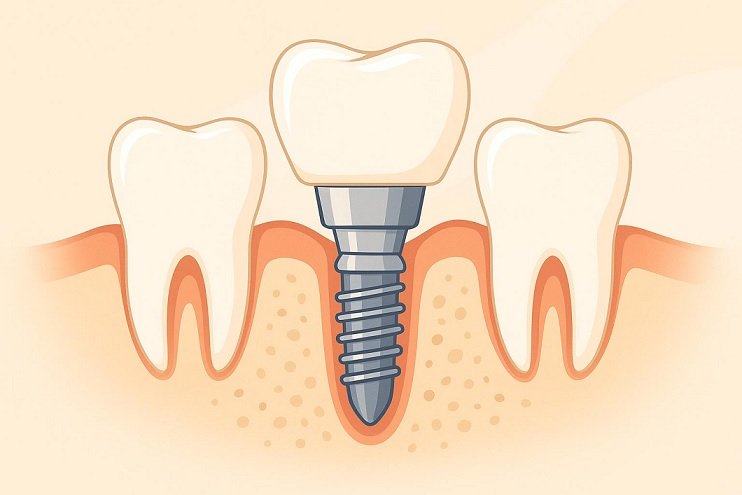Missing a tooth changes everything. You know the feeling – that gap where your smile used to be complete, the way you cover your mouth when you laugh, the foods you avoid because chewing feels different.
Here’s the thing most people don’t realize: dental implants aren’t just about filling that space. They’re about getting your life back.
After working with Burlington families for over three decades, I’ve seen how the right tooth replacement can transform someone’s confidence overnight. But I’ve also watched patients get overwhelmed by conflicting information about costs, timelines, and what the process actually involves.
So let’s cut through the confusion. This is your complete guide to dental implants in Burlington – real costs, actual timelines, and what you can expect from start to finish.
What Makes Dental Implants Different?
Think of a dental implant as a complete tooth replacement system, not just something that sits on your gums. While dentures and bridges only replace the visible part of your tooth, implants replace everything – including the root.
The implant itself is a small titanium post that gets surgically placed into your jawbone. Over time, your bone actually grows around this post, creating a foundation that’s often stronger than your original tooth root. Then we attach a custom crown that matches your natural teeth perfectly.
Why does this matter? Because it’s the only tooth replacement option that prevents the bone loss that happens when you lose a tooth. Your jawbone needs stimulation from a tooth root to stay healthy. Without it, the bone gradually disappears – which is why some people with dentures develop that sunken-in facial appearance.
The Real Cost of Dental Implants in Burlington
Let me be straight with you about pricing. In Burlington, you’re looking at roughly $3,000 to $6,000 for a single dental implant. That includes the implant post, the abutment (the connector piece), and your custom crown.
Now, I know that might make you pause. But here’s what most people miss when they compare implant costs to cheaper alternatives.
A well-placed dental implant can last 25 years or more with proper care. Compare that to bridges (typically need replacement every 10-15 years) or dentures (usually require adjustments, relines, or replacement every 5-10 years). When you factor in those ongoing costs, implants often become the most economical choice long-term.
What affects the cost?
- Whether you need bone grafting (if you’ve been missing the tooth for a while)
- The complexity of your specific case
- The type of crown material you choose
- Any additional procedures needed
For full mouth restoration using implants, costs typically range from $6,000 to $60,000 depending on how many implants you need and whether we’re doing individual implants or an All-on-4 approach.
Important note about insurance: Here’s something that catches many people off guard. The Canadian Dental Care Plan (CDCP) specifically excludes dental implants and all implant-related procedures. This isn’t likely to change – implants are considered a permanent exclusion under the plan. Some private insurance plans offer partial coverage, but most dental implant treatment will be out-of-pocket.
The Step-by-Step Implant Process
Initial Consultation (Week 1) We start with a comprehensive exam, including digital X-rays and often a 3D scan of your jaw. This isn’t just about the missing tooth – we’re evaluating your overall oral health, checking your bone density, and making sure you’re a good candidate for implants.
During this visit, we’ll discuss your options, timeline, and create a treatment plan tailored to your situation.
Preparation Phase (Weeks 2-4) If you need a tooth extracted, we typically wait 2-3 weeks for initial healing before placing the implant. Some patients need bone grafting if there isn’t enough bone to support the implant. If that’s the case, bone grafts usually require 3-4 months of healing before we can place the implant.
Implant Placement Surgery (Day of Surgery) The actual surgery typically takes 1-2 hours per implant. We use local anesthetic to ensure you’re completely comfortable, and we offer sedation options for patients who feel anxious about the procedure.
The process involves creating a small opening in your gum and jawbone, then carefully positioning the titanium implant post. Most patients are surprised by how manageable the procedure feels.
Initial Recovery (Weeks 1-2) The first 24 hours are crucial. You’ll have some bleeding (controlled with gauze), swelling, and discomfort – but most patients find it’s very manageable with over-the-counter pain medication and ice packs.
We recommend soft foods for the first week, avoiding the implant site when brushing, and using a prescribed mouthwash. Most people return to work the next day, though some prefer to take 2-3 days off.
By two weeks, you should feel back to normal, though the implant will still be healing underneath.
Osseointegration (Months 2-6) This is the magical part, though you won’t feel it happening. Your jawbone gradually grows around the implant post, creating an incredibly strong foundation. This process typically takes 3-6 months.
During this time, you’ll have follow-up appointments so we can monitor healing. Some patients get a temporary crown for appearance, especially if the missing tooth is visible when you smile.
Final Restoration (Month 6-8) Once osseointegration is complete, we take impressions for your permanent crown. The crown is custom-made to match your natural teeth in color, shape, and size. When we place your final restoration, your implant journey is complete.
Recovery Tips That Actually Matter
First 24 Hours:
- Keep gauze in place until bleeding stops
- Use ice packs 20 minutes on, 20 minutes off
- Stick to soft, cold foods (yogurt, smoothies, ice cream)
- Avoid rinsing forcefully or using a straw
First Week:
- Continue soft foods
- Brush other teeth normally, but avoid the implant site
- Use prescribed mouthwash gently
- No smoking (seriously – it significantly increases failure risk)
Long-term Success:
- Treat your implant like a natural tooth – brush and floss regularly
- Keep up with regular dental cleanings and checkups
- Don’t use your teeth as tools (no bottle opening!)
- If you grind your teeth at night, wear a nightguard
Why Choose Houston Dental for Your Implant Treatment
Over 30 years of serving Burlington families has taught us that successful implant treatment is about more than just surgical skill. It’s about understanding each patient’s unique situation and creating a treatment plan that fits their needs, timeline, and budget.
We use advanced digital imaging technology to plan your treatment precisely, reducing surgery time and improving outcomes. Our anxiety-free approach includes sedation options for patients who need them. And while we accept CDCP for many services, we’ll work with you on payment plans for implant treatment since it’s not covered.
Most importantly, we believe in conservative treatment recommendations. If there’s a simpler solution that will work well for your situation, we’ll discuss that too. Dental implants are an excellent option for many people, but they’re not always the only option.
Is It Worth It?
Here’s what I tell patients who are trying to decide: dental implants aren’t just about replacing a tooth. They’re about preserving your jawbone, protecting your other teeth, and maintaining the function that makes eating and speaking comfortable.
The upfront investment is significant. But when you consider the decades of use you’ll get, the confidence that comes with a complete smile, and the ability to eat all your favorite foods again – most patients tell us it’s one of the best investments they’ve ever made.



